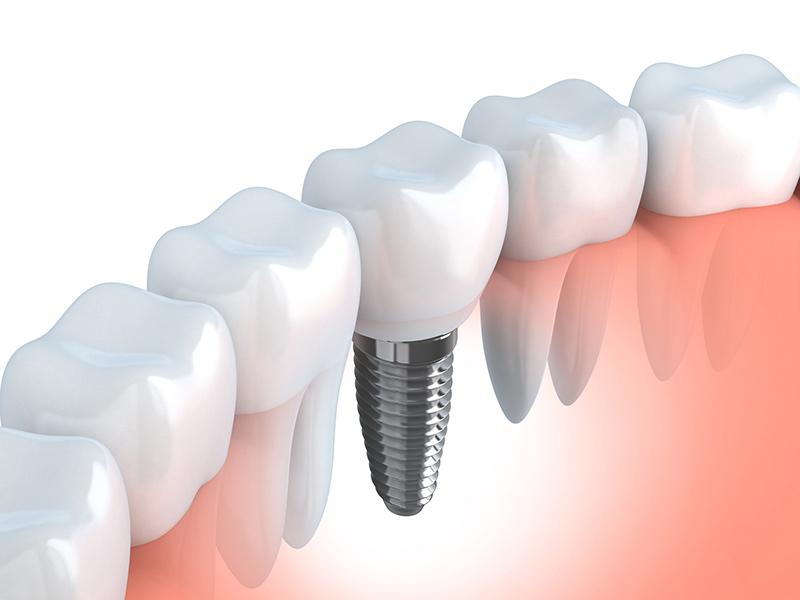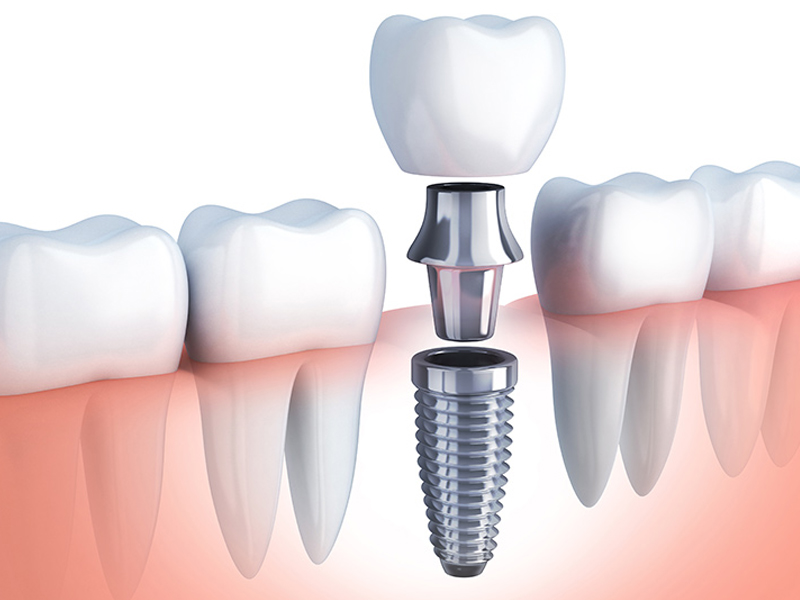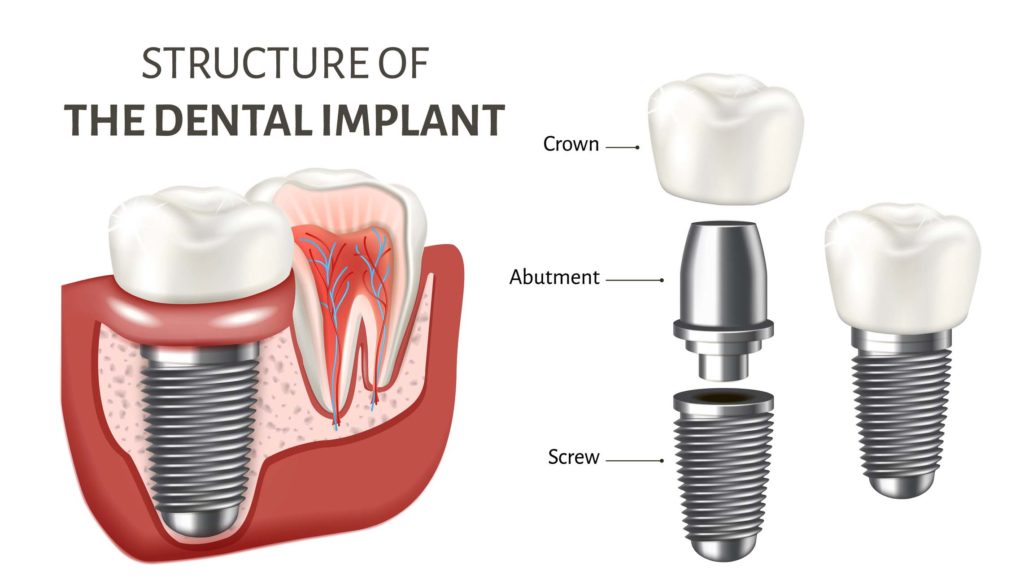
Dental Implants
Dental implants are the natural-looking replacement solution to one or more missing teeth. They look and feel like natural teeth. Since implants are permanently anchored into the jawbone, this cosmetic dentistry solution allows for better chewing than removable dentures.
Dental implants are only available for those with healthy and mostly intact oral tissues and jawbone ridges.
Dr. Eisenman will analyze your individual situation to determine if your oral tissues are healthy enough and your jawbone is in good enough shape to withstand an implant. If not, he will recommend another dental makeover solution.
Traditional Dental Implants – Like Natural Teeth
In cosmetic dentistry, dental implants are the closest thing to having real teeth. A traditional dental implant is an artificial tooth root, similar in shape to a screw.
When placed into your jawbone, they bond with your natural bone and become a strong base or foundation to support one or more artificial teeth.
Dental Implants look and feel like natural teeth and can last the rest of your life when cared for properly.

Some patients who are not candidates for traditional implants may be able to have Mini Dental Implants which are often used to secure an upper or lower dentures.
Advantages of Dental Implants
Dental implants are an exceptional solution for tooth loss because:
- They look, feel, and fit exactly like your original permanent teeth
- Require minimal care, mostly regular brushing and flossing and periodic dental checkups
- Allow you to comfortably eat anything you want
- Never slip, slide, or cause any embarrassment
- Never cause dental pain
- Can last a lifetime, with proper care
- Dental implants also will never develop cavities!
Health Benefits of Dental Implants
Dental implants also provide necessary and crucial health benefits for your jaws and gums including:
- Keeping other teeth from shifting in the mouth
- Preventing changes to the shape and look of the face
- Allowing a person to chew with the same amount of force as with their natural teeth
- Maintaining support for normal speech habits
- Preventing bone loss
- Again, dental implants will never develop cavities!

How Dental Implants Work
Dental implants are the strongest devices available to support replacement teeth. They feel, look and function like natural teeth.
Dental implants are replacement tooth roots that provide a strong foundation for fixed or removable replacement teeth made to match your natural teeth.
When performed by a trained and experienced dental implant dentist, dental implant surgery is one of the safest and most predictable procedures in dentistry.
The Structure of a Dental Implant
There are three basic parts to a dental implant.
The implant – very similar in design to a screw.
A connector – called an abutment, is placed on top of the dental implant to hold and support your crown.
A crown – which is custom-made to match your natural teeth and fit your mouth properly.

Dental Implant Procedure - What to Expect
Though each patient is different, dental implant procedures usually involve the following:
1. A Consultation:
Your dentist will examine your mouth, take X-rays and/or images. He or she will then go over your options and create a plan for implant surgery.
2. Placement of Your Implant:
During the next appointment, the dental implant will be placed in your jawbone. Most people experience little pain and certainly less than they expect. Usually you can go on with your regular routine the following day.
Local anesthesia or IV sedation can be used to keep you comfortable. Post-implant surgery discomfort is much like that of any other dental surgery. You may experience some swelling, bruising, minor bleeding, and discomfort. Discomfort can be managed with regular over the counter pain relief.
3. Osseointegration and Healing:
As you heal, osseointegration (os-e-o-in-tuh-GRAY-shun) takes place as your implant and jawbone grow and bond together to form a strong, foundation for your tooth replacement. A soft food diet is necessary for the first few weeks to ensure proper healing.
4. The Abutment is Placed:
Once your implant has properly bonded with your jawbone, an abutment is placed on the dental implant just above the gumline. Sometimes the abutment can be placed at the same time as the implant. The abutment is the connector between the implant and your new tooth or crown.
5. A New Custom-Made Tooth is Attached
An impression is taken of your mouth is taken to custom make a crown that will match and fit properly with your existing teeth. The crown is attached to the abutment.
Dental Implants vs. Crowns, Bridges, or Dentures
Dental implants feel, look, fit, and function like your natural teeth. They also help you retain your natural face shape and smile.
You brush and floss them just like you do your natural teeth. With dentures, you must remove them for brushing and cleaning.
Bridges and dentures may require replacement every five to ten years. When properly cared for, dental implants can last your lifetime.
Implants are secure. They do not click when you talk or eat. They won’t slip out of place like dentures. Your speech will be natural. You can eat, talk, and smile freely with confidence.
Implants are better for your jawbone and nearby teeth. They can stimulate bone growth and prevent bone loss. With bridges, adjacent teeth may have to be ground for anchoring. With implants, adjacent teeth are not altered.
For those with dental fears:
WE LISTEN
WE UNDERSTAND
WE CARE
Frequently Asked Questions About Dental Implants
Basic dental insurance generally doesn’t cover dental implant procedures. However, each plan is different, so you should check yours for details. If your plan does cover some of the implant costs, you will still need to contribute.
A cosmetic dental procedure insurance plan may be helpful, but not likely to cover 100% of cost.
Medicare doesn’t cover dental implants. However, some Medicare Advantage plans provide benefits for dental care, including dental implants. Approved insurance companies offer these plans.
If coverage is from a Medicare Advantage plan, you may need to use an in-network provider. Co-payments vary from plan-to-plan.
A dentist performs implant surgery while the patient has had general or local anesthesia. So, the patient feels no pain during the procedure.
Some patients feel mild pain, tenderness, or discomfort once the anesthesia wears off, and up to one week later. After that, you should not have any discomfort from the implants.
You must be in good dental health with a strong enough jawbone to hold the dental implant. In this case, dental implants are completely safe. Dental implants withstand the test of time. They will not break, shift, irritate your gums, nor cause any damage to other teeth in your mouth.
Dental implants have several functions.
- They can replace your dental bridge. This means that you will now have the closest thing to real, permanent teeth in your mouth.
- Dental implants can secure a bridge in place. The implants are held securely in the jawbone and support a porcelain restoration that replaces your missing teeth.
Normally dental implants stay in your mouth forever. However, a dentist can remove your dental implant screw. This can cause slight damage to the jawbone and bone grafting may be needed to replace the lost bone.
A new implant can be inserted once the jawbone is healthy. A dentist can always easily remove or replace the crown portion.
Dental implant screws are made to last a lifetime. It’s important to practice proper oral hygiene to keep the gums and jawbone healthy.
The implant is made up of an implant screw and a porcelain crown. The upper porcelain portion may need replacement after ten or fifteen years.
Technically, you can have as many dental implants as you have teeth that are damaged. When teeth need to be replaced, your dentist will tell you the best treatment option.
Sometimes dental implants replace teeth on a 1:1 basis. Other times dental implants support crowns, to replace several or many teeth.
Dental implants are the optimal solution for tooth loss, but they are not right for everyone. Get all the details and answers to one of our most common questions, “Are dental implants are right for you”.
